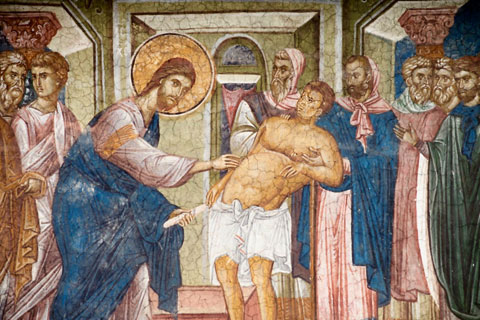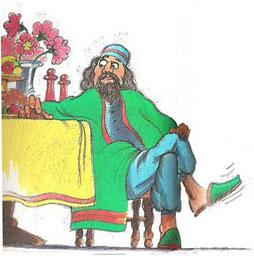
Reflection by Deborah Beach Giordano
A Trap is Sprung
Jesus has been invited to a Pharisee’s house for a Sabbath dinner; that fact alone should put us on our guard. We know that the Pharisees are not friends of His, but dislike Jesus and all of his doings and would like to be rid of him — we’ve been warned that they were keeping him under surveillance, and are searching for a cause to accuse Him before the authorities.
Look out, Lord, it’s a trap!
And, lo and behold, the first person He encounters is a man suffering from a disease. You don’t have to read spy novels to know that this guy has to be a plant; put there specifically in order to tempt Jesus to do a healing. Of course the Lord did precisely that: performed a healing on the Sabbath, in front of all of those witnesses.

The conspirators at that dinner, however, must have been disappointed. Their hoped-for “gotcha” moment was less than successful. Jesus knew what was going on, for he posed the question: “Is it lawful to heal on the Sabbath?” and answered it at the same time, first, by healing the man, and secondly by offering a teaching. Who would allow a helpless creature to die if we could intervene — no matter what day of the week it is? The answer seems obvious to anyone with a heart.
The guests must have been standing near by, close to Jesus, “watching to see what He would do,” and now they began shuffling off to find their seats and try to enjoy the dinner. Some were surely cheered in thinking that they had indeed snared Him in their trap, while a few may have been challenged and troubled by His words; others, uncertain and cautious, were perhaps taking comfort in the thought that this backwoods preacher might say something else during the meal that they could use against Him.
The Missing Link
We hear nothing further about the man whom Jesus healed. Perhaps he went forth rejoicing, hurrying off to the temple to offer grateful praise, or so delighted with his restored health that he was turning handsprings in the street. Although the man disappears from the story, his presence was significant, and serves as a preamble to what follows.
The fellow was described as suffering from “dropsy” — an older term for what we now call edema: it is a swelling of the extremities and abdomen caused by heart disease. Basically, the man was puffed up because there was something wrong with his heart.
Jesus was able to cure that illness, and does so, instantly. “He laid his hands on him, healed him, and sent him on his way.” Bing, bang, boom. Over and done with. Healed and restored. But then Lord was confronted with a much more virulent form of being “puffed up” — caused by hearts that could not — would not — submit to the Lord’s healing ministrations.
 The sufferers were the ones who were attending the Sabbath dinner; those who were puffed up with self-importance, inflated egos, convinced of their moral superiority. They were the sort who gave Pharisees a bad name, as the word has come to denote smug self-satisfaction and sanctimonious hypocrisy. They considered themselves to be above the rest of the people: smarter, wiser, holier, just all-around better — as personified by Jesus’ story of the Pharisee who thanked God that he wasn’t one of those despicable, lower-order others:
The sufferers were the ones who were attending the Sabbath dinner; those who were puffed up with self-importance, inflated egos, convinced of their moral superiority. They were the sort who gave Pharisees a bad name, as the word has come to denote smug self-satisfaction and sanctimonious hypocrisy. They considered themselves to be above the rest of the people: smarter, wiser, holier, just all-around better — as personified by Jesus’ story of the Pharisee who thanked God that he wasn’t one of those despicable, lower-order others:
The Pharisee stood off by himself and prayed, “God, I thank You that I am not like other men: swindlers, evildoers, adulterers — like that tax collector there.”
~ Luke 18:11
Now, as He watches the dinner guests make their way to the table, Jesus offers a warning. Tactfully, He does not draw the obvious parallel between these characters, so full of themselves, and the bloated fellow he has just healed, but instead starts talking about seating arrangements.
A Parable of Disgrace or Distinction
Imagine being at a pubic celebration — an awards dinner perhaps, and taking a seat at the head table, smiling down at the audience, certain of your status, confident that you will be honored …. and then being approached by the emcee and told that you must surrender your place to another. You are not the big cheese, there are others much greater: you aren’t all that. Imagine the terrible Walk of Shame as you slink away to a far distant table. Not a pleasant thought!
Now imagine the same situation, but this time you’re sitting with the rest of the people, just another one of the crowd… and all at once your name is called, and you are invited to a place at the high table. There, in front of colleagues and neighbors, your work and your character is lifted up and celebrated. Quite a difference — and much to be preferred.
Where You Stand…
Where you stand depends on where you sit.
~ Miles’ Law
 Jesus’ parable gave those Pharisees something to consider as they rested their rumps on the soft, tufted cushions. Perhaps they were sitting where they didn’t belong; perhaps they weren’t morally superior, or wiser, or smarter, or the best, brightest folks in the town; perhaps they had situated themselves above others and might, any day, be brought down.
Jesus’ parable gave those Pharisees something to consider as they rested their rumps on the soft, tufted cushions. Perhaps they were sitting where they didn’t belong; perhaps they weren’t morally superior, or wiser, or smarter, or the best, brightest folks in the town; perhaps they had situated themselves above others and might, any day, be brought down.
What an uncomfortable thought! Imagine how they must have felt at such a mind-altering, ego-shattering notion.
Imagine if you had mistakenly believed yourself to be a member of Team Righteous; wrongly assuming that you were one of the knowing, the clever, the good, the noble, and the wise. Imagine realizing that you are just as liable to faults and failings as the next person; not better, not superior — but in critical danger of becoming much worse off, due to inflated egotism. Imagine discovering that you are so full of yourself, so puffed up with self-admiration, that you’re nearly ready to pop!
No wonder the Pharisees despised the Lord. No wonder they sought to silence and destroy Him. Nobody wants to hear such things.
Dangerous Inflation

The Pharisees were not unique. They suffered from a disorder that all flesh is heir to: the temptation “to be as gods;” setting ourselves above others, judging and condemning, convinced that we are wise, noble, and good. This poisonous puffery is not specific to Christians — although it is rampant across our faith; it is everywhere present, infecting cultures and peoples of every nation and age and creed.
It is an insidious disease, an edema of the soul, egotism spiraling out of control. What begins as a well-intentioned good work turns into a demand to be acknowledged, recognized, and honored; criticism is intolerable: we are jealous of our status. Puffed up with a sense of superiority, we become so full of ourselves that we can see nothing — or no One — else. It is a recipe for stumbling, and falling, and forgetting that we’ve been called to serve, not be celebrated.
Gracious Lord, bless our comings and our goings, our sitting and our standing — and may we always take a stand for You. Amen.
May Christ’s grace and healing love abound,
Deborah ✝
Suggested Spiritual Exercise
When you sit down — at home or away, take a moment to consider your attitude toward others. Are there those you look down on; people you’ve set yourself above?